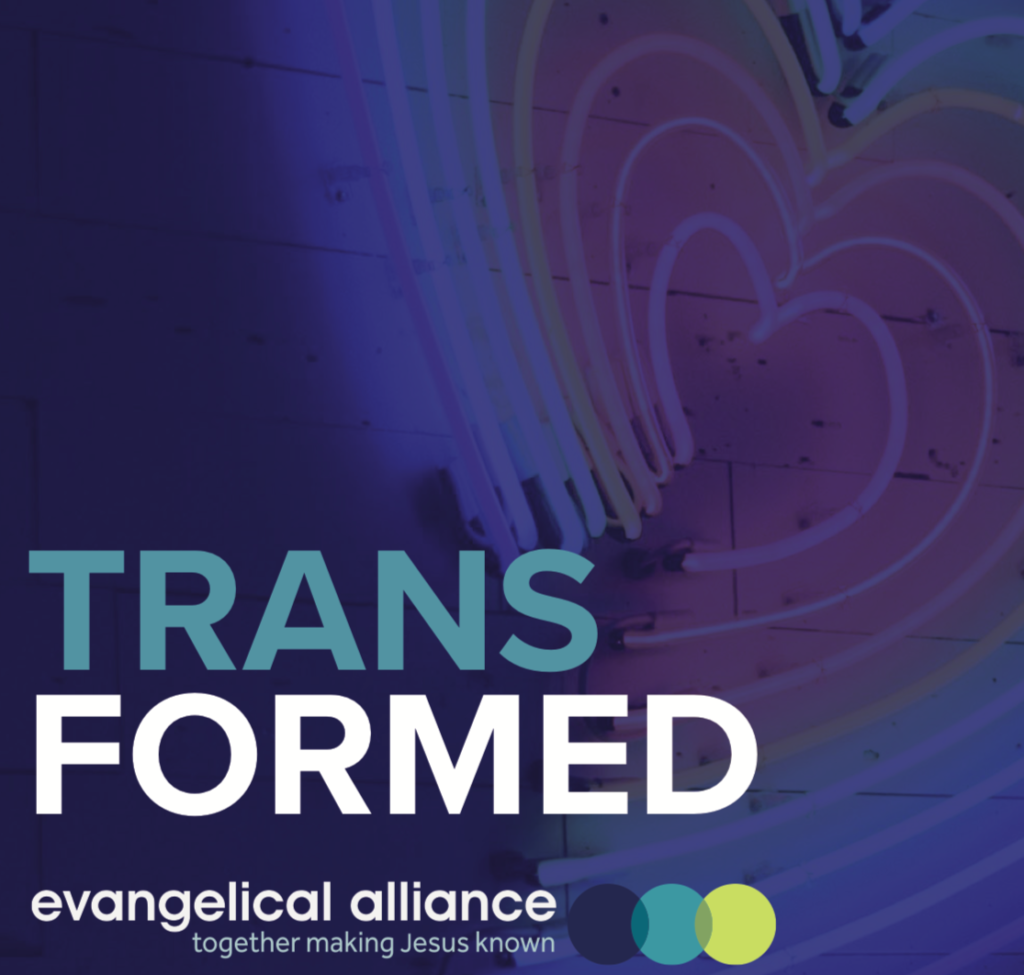This is the fifth of six posts on the Evangelical Alliance’s Transformed report. See the first, second, third, and fourth.
The rest of the report
We have now covered most of the theological substance of the report – and most of the arguments that I wanted to analyse. There’s quite a bit more material in the report, but rather than go through it in the same detail as in my earlier posts, I simply want to point out a few things that struck me, none of which do much to change the basic argument – or to explain why the authors take the negative stance they take.
Pastoral responses
The initial material on pastoral application seems at first to be surprisingly open, given the arguments earlier in the report. That is, it seems for a moment to hold open possibilities of welcome, even of the celebration of transgender people who have transitioned, despite everything the report has already said to condemn them. So the report mentions a variety of frameworks, including a ‘diversity framework’ in which transgender experience would be ‘celebrated and honoured as part of normal human diversity’ (p. 13). Instead of, as one might have expected by now, simply ruling out such a response, the authors instead briefly advocate an ‘integrated’ response that can ‘draw on the best each framework offers’ – including this diversity framework (p.14).
That door is quickly closed, however. The report moves immediately to use the story of Jesus and the woman at the well (p.15) to illustrate the only kind of compassionate welcome that they are willing to offer to transgender people. In other words, the model we are offered is of Jesus challenging the woman at the well about her five husbands, and her living with a man who is not her husband. There is no hint of celebrating or honouring here: the model we are offered is of challenging someone’s sinful life. The authors want to stress, of course, the gentleness and compassion with which this challenge should be offered, but they are still bluntly declaring transgender people in the wrong, depicting their decisions and their lifestyle as sin. The rest of the pastoral advice (which I’m not going to analyse here) is governed by that conviction.
What does science say?
The report carries on into a discussion of ‘Science, statistics, medicine and therapeutic interventions’. The summary is meant – I assume – to be fair-minded and balanced. After all, we have been urged (p. 15) to ‘rise above the sex and gender culture wars’. Yet every sentence in the summary provided of the science on p. 18 – literally every single sentence – is framed negatively: ‘Limited reliable statistics’, ‘significant debate’, ‘unforeseen or unintended side-issues’, ‘harm’, ‘horrendous results’, ‘not well-enough understood’, ‘untested interventions’, ‘extremely limited evidence’, ‘lack of long-term data’, ‘a turn towards darkness’, ‘poverty of research’.
Anyone reading only this (and the pages that follow) would conclude that all the relevant science supports only the report’s point of view – which is simply not true (or even close to being true).[1] The authors aren’t even trying to present a balanced view; they display no commitment whatsoever to the balance and fairmindedness that they appeared to have promised.
The law
I don’t have anything much to say about the material on ‘law, education, and free speech’. Given that I don’t agree with the arguments at the heart of the report, I’m hardly going to agree with the implications set out here, and I’m not sure there’s much to be gained by running through the ways in which I find the descriptions offered biased, and the prescriptions misplaced.
I would note, though, that the comment on p. 23 that ‘There are proposals to change the law across the UK to let people decide their own gender’ (which echoes an earlier comment on p. 5), is, if it is meant to refer to the proposed changes to the Gender Recognition Act, not at all an accurate summary – though it does echo the way in which the Act has been caricatured by other opponents. Once again, the authors of this report haven’t made any real effort to ‘rise above the sex and gender culture wars’.
Cultural trends
The last bit of the report that I want to point to is the final substantive section, on ‘The Cultural Trends’ (pp. 27–28). I hope I have managed, in my discussions in my earlier posts, to take the report seriously, and to discuss it on its own terms, even if I have done so in order to explain how badly I think it is mistaken. By the time we get to this section of the report, however, I’m afraid I think it has descended into farce. The transgender movement, it turns out, is the product of every malign influence that haunts the authors’ bad dreams: relativism, post-Christendom thinking, individualism, Gnosticism, dualism, feminism, post-structuralism, queer theory, cultural Marxism, and consumerism. This is not serious cultural analysis; it is not even close. It is little more than a series of lazy caricatures and tired sermonic tropes.
It is, for instance, simply not true that we are surrounded in this discussion by people who think that there are no absolutes, and no right way to understand the world or ourselves; it is simply not true that we are surrounded by people who insist that we are free from all obligations – any more than it is true that we are surrounded by resurgent Gnostics. I can’t think of a single one of the people I know who are transgender or supporters of trans people for whom any of this would be remotely accurate as a description – and you only need to give a few minutes’ thought to (to pick just one example) the convictions about ‘consent’ that are deeply embedded in these discussions to begin seeing that this description just does not stand up.
This is not the kind of account you would come up with if you were – as the authors have insisted that we need to be – committed to careful engagement with the people with whom you disagree, attentive to their voices, and determined even in your disagreement to understand them charitably. It is lazy and dismissive, and unworthy of the serious organisation that has put its name to this report.
Footnote
[1] As a corrective, you could look at a systematic review of ‘all peer-reviewed articles published in English between 1991 and June 2017 that assess the effect of gender transition on transgender well-being’, which provides links to all 73 studies that it discusses, and explains its search methodology so that you can judge for yourself whether it is cherry-picking. See ‘What does the scholarly research say about the effect of gender transition on transgender well-being?‘, What We Know, Cornell University. They found 52 studies which showed gender transition improving the well-being of transgender people, and 4 with mixed or null findings. The remaining 17 they cite were literature reviews or guidelines.
This is the fifth of six posts critiquing this report.
1. Whose stories?
2. The varieties of trans experience?
3. Listening to the Bible
4. Confused bodies
5. The rest of the report
6. Conclusion



Recent Comments